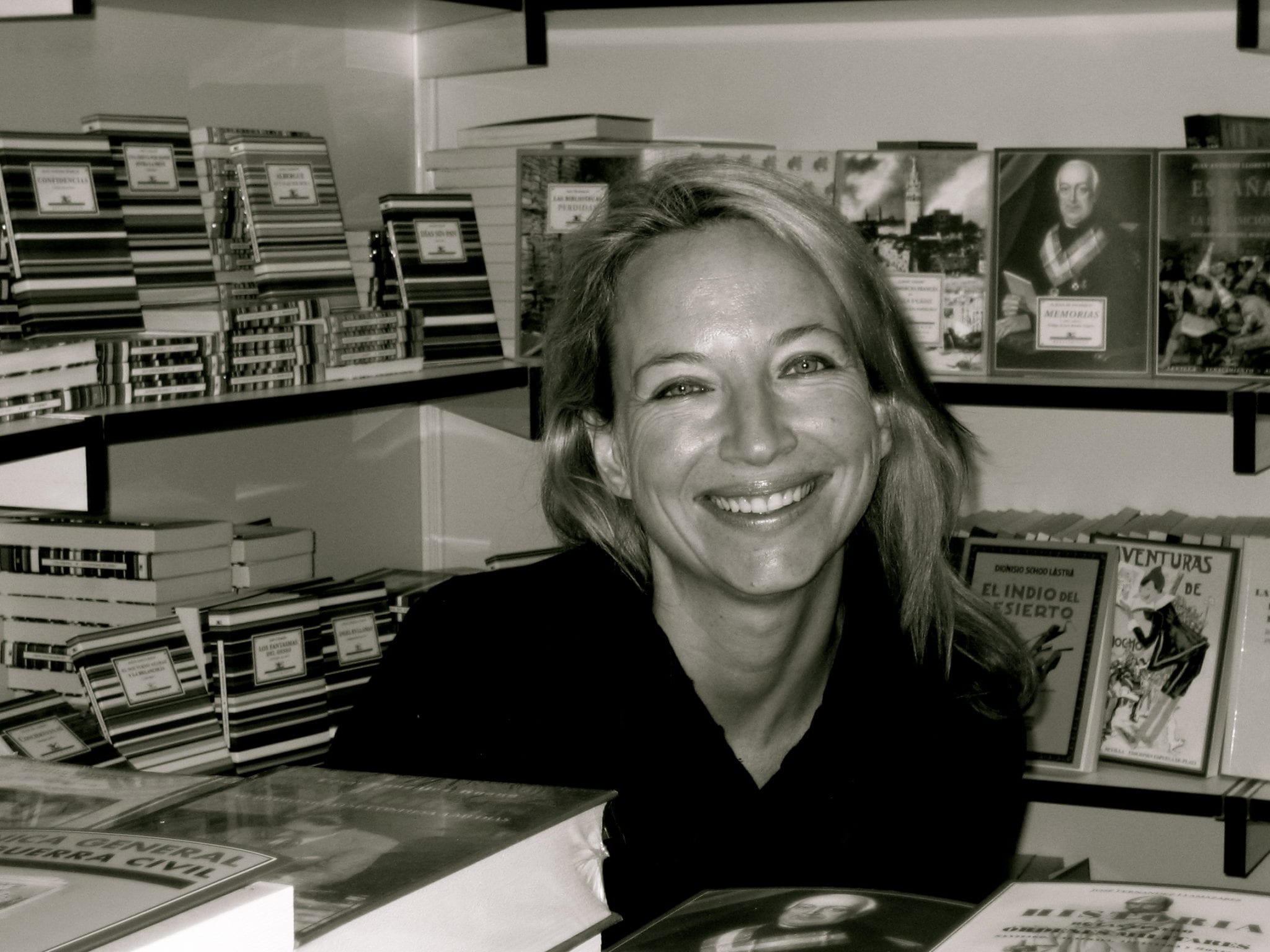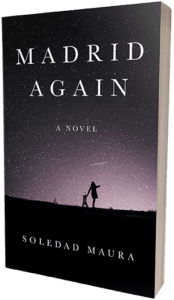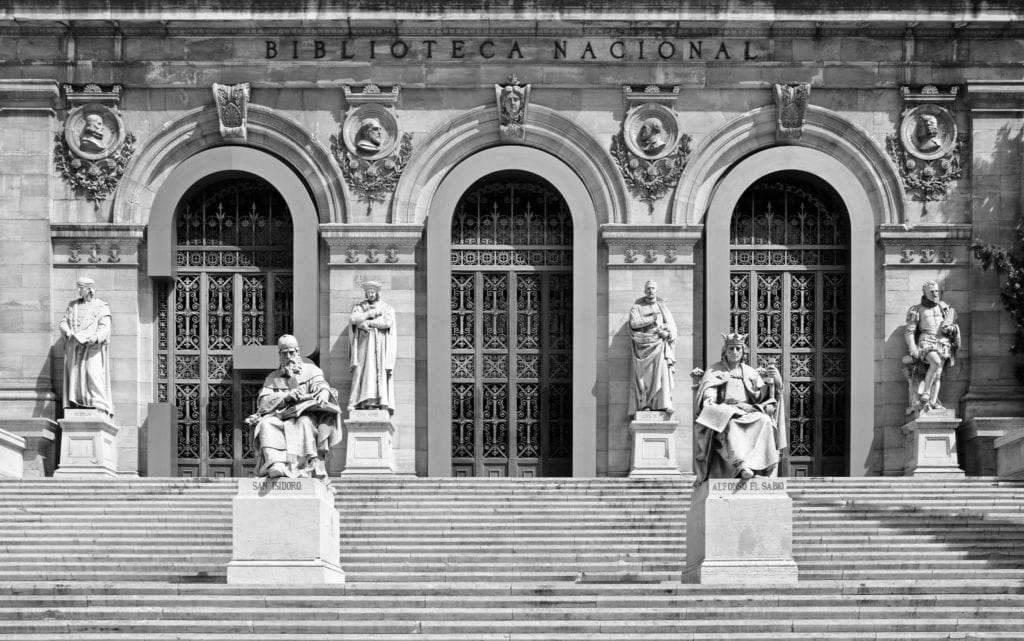
By Jeremy Wang-Iverson
Virtual Launch Events for Madrid Again:
17 November 1:00 pm GMT
The Oxford Centre for Life-Writing (in conversation with Hannie Lawlor)
Register here
17 November 7:00pm EST
The Silver Unicorn Bookstore (in conversation with Aaron Shulman)
Register here
Read Soledad Maura’s recent piece on the US election in El País, Las mujeres han hablado, Biden ha ganado.
 Madrid Again is your first novel, but it also covers some of the same themes as your nonfiction work, particularly the 20th century in Spain and the effects of the dictatorship on ordinary lives – what were some of the differences for you as a writer taking on these questions in fiction?
Madrid Again is your first novel, but it also covers some of the same themes as your nonfiction work, particularly the 20th century in Spain and the effects of the dictatorship on ordinary lives – what were some of the differences for you as a writer taking on these questions in fiction?
Anything I write is going to reveal what is important to me. I’m not a scholar or novelist who is going to work on a subject I don’t connect with because it is fashionable or might be helpful to my career. The Spanish Civil War and postwar shaped generations of Spaniards. It’s always there. But this is not a historical novel. It’s a young woman’s contemporary quest for some kind of identity. The world created in my novel is much more intimate, and at times amusing, than my scholarly work. Another big difference: no footnotes or bibliography.
The narrative in Madrid Again moves very fast and we have some sense of the novel as it is being written; the novel is dated January 2020 at the conclusion, just before the onset of the pandemic; when did you start writing it? Was it written chronologically?
The novel has gone through so many transformations since I wrote the first part of it about a decade ago. I’ve written it in my “spare time”. The story is not chronological, and the order has changed over rewrites. One goal I had was to create a voice that was strong enough for the reader to follow across the Atlantic and back, and into the past and back to the present. The narrator’s voice had to unify times and places that would otherwise be disconnected. I’m glad it moves very quickly from the reader’s point of view, because It took me a very long time to get it there, and if it moves fast I feel like I’ve achieved something. I finished final corrections in January 2020, in Barcelona. The main character has no sense of an impending pandemic, but she is someone who is quite wary about the future. She is a narrator/writer who wants to finish “her novel” before the next world disaster comes. So you could say she gets there just in the nick of time.
The novel seems to rely heavily on memory; were you in conversation with those closest to you as you wrote it?
Many of the stories in the novel are versions from my own memory, the memory of others, from my own family, and many are fiction. There’s not one story that hasn’t been fictionalized in some way. There are fragments of memories, and letters, but they are unreliable memories and don’t aspire to be objective—there’s no straight oral history in this novel. Throughout the years I wrote I was always eager to hear more details and new stories, but I didn’t discuss what I was writing with family during the process. Writing is very private for me, until it isn’t, when it is published or about to be.
As people assimilate to survive, their private worlds are lost and forgotten in their new cultures, and in their old ones. The liminal space occupied by people in transit is lonely, underrepresented, and I think, extremely compelling. I wanted to create a novel that revolves around these types of spaces, and the characters that inhabit them.
You wrote a reading list for LitHub on “Americans Abroad in Literature,” but what are you reading now? Who are your influences as a novelist?
The books on that list are very important to me, and you’ll notice that I mention letters, journalism, essays, novels, memoirs. As a literary scholar, I am very aware of genre, and I love novels from many periods, but as a reader I have no boundaries, though recently I gravitate towards what we now call “life-writing”, which can include all of the above as well as diaries and biography. To get back to the voice, I am drawn to the first-person. I love memoirs, and novels that read like memoirs, that really blur the identity of the character and the author. As a child in school I was knocked out by Holden Caulfield in The Catcher in the Rye and the Diary of Anne Frank. It’s been a while since I have reread either one, but I was immediately passionate about the first-person voice. It felt liberating. I had a similar experience with The Long Voyage by Jorge Semprún. Over the past few years I have enjoyed reading (and re-reading in some cases, when they are books I teach), in no particular order: Philip Roth, Elaine Dundy, Ben Lerner, Sebald, Merce Rodoreda, Carmen Laforet, Deborah Levy, Annie Ernaux, Ottessa Moshfegh, Edna O’Brien, Jhumpa Lahiri, Ian McEwan—especially Sweet Tooth.
Can you tell us about your work as a scholar, particularly your biographies of Constancia de la Mora and Jorge Semprún – who are they? What drew you to their work?
A biography is a major commitment. Especially the research. Biographical writing is something I love. De la Mora and Semprún both have in common that their fascinating lives were derailed by the Spanish Civil War, and that each fought back, in different times and places and in different ways, but each put their life on the line to fight for Spanish democracy. They both became communists, but both also fell out with the party. De la Mora ended up exiled in Mexico and had a tragically short life, and Semprún spent most of his long life in Paris.Both of them wrote autobiographical works, and as a biographer one of my tasks was to be able to contextualize their own versions of events, and also write around those versions and bring in new materials.
One of the major themes in Madrid Again is the narrator torn between two cultures (Spain and the United States) with a difficulty to determine her home, and the conflict changes as she grows up and learns more – can you talk about this a little? How did you want to bring it out in the novel? It feels particularly poignant now as we’re at a political moment where many countries are turning inward.
For Lola, the narrator, Spain and the United States are both crucial to who she is. She would never choose because they’re equally important to her identity: it’s the world that imposes choice. Her mother is an immigrant, and though she has certain very important advantages (primarily her education), being in a foreign country (the United States) as a young woman with a young daughter is not easy, or welcoming. As people assimilate to survive, their private worlds are lost and forgotten in their new cultures, and in their old ones. The liminal space occupied by people in transit is lonely, underrepresented, and I think, extremely compelling. I wanted to create a novel that revolves around these types of spaces, and the characters that inhabit them. The characters in Madrid Again may not be heroic, but they are strong, and even brave.
Many of the stories in the novel are versions from my own memory, the memory of others, from my own family, and many are fiction. There’s not one story that hasn’t been fictionalized in some way.
Now as you have written both as a novelist and scholar, do you feel more comfortable in a particular genre? What will your next project be?
Both genres are very interrelated for me. One of my favorite courses in graduate school was taught by Beat poet Allen Ginsberg. It was an exceptional experience, but there you go, a poet teaching a literature class. I also studied creative writing and always thought about a novel, so I think it was just a matter of when. I have never stopped my scholarly work, or teaching, to write this novel. That is why it took me so long. For the past year I have been working on two editions of long-lost Spanish women’s lifewriting (forthcoming in later 2020 and early 2021 with Editorial Renacimiento) and have an ongoing project on American art collectors in Spain at the turn of the 19th-20th century. At the same time, I have started work on another novel. It is a bit of a mystery. The main characters are two female friends, and one of them goes missing. I shouldn’t say more because spoilers are not good for mysteries.
Soledad Fox Maura is a Professor of Spanish and Comparative Literature at Williams College. She is the author of three previous books, including most recently Exile, Writer, Soldier, Spy: The Life of Jorge Semprún, also published by Arcade.

Excerpt from MADRID AGAIN: “On one of our last days in Madrid I go to the Biblioteca Nacional to print out a couple of articles I need for my research. My old ID has expired, and I am dreading the complications of getting a new one. As I start to explain who I am and what I need to the guard at the front desk of this vast, majestic library, she gives me a sheet with descriptions of the diferent cards I can apply for. As I scan the paper, searching for the one with the least red tape, I see “Author..” I tell the guard, “I am an author.” She asks if my book will come up in the library holdings. I nod. She plugs in my name, sees my book, and I instantly get my fanciest card ever.”
